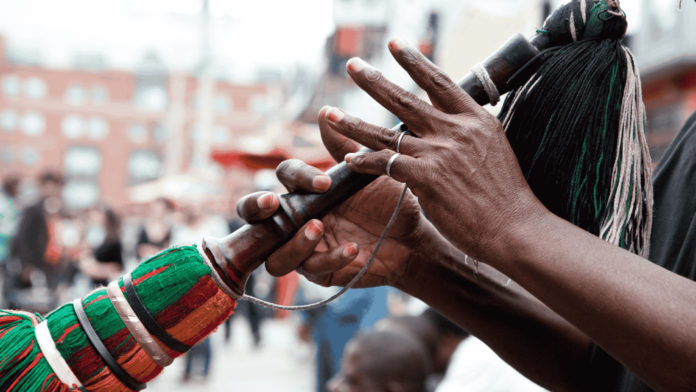Nigeria, known as the “Giant of Africa,” is a land of incredible cultural richness and diversity, with over 250 ethnic groups celebrating unique traditions throughout the year. The country’s annual festivals are a true reflection of its heritage, offering immersive experiences filled with vibrant music, dance, art, and cuisine. From energetic street parades to deeply spiritual ceremonies, these festivals go beyond mere events they are living expressions of Nigeria’s identity. If you’re seeking a journey into the heart of Nigerian culture, these must-attend annual festivals promise unforgettable memories.
1. Eyo Festival (Lagos State)
What It’s About
The Eyo Festival, also known as the Adamu Orisha Play, is one of Lagos’s most iconic cultural celebrations. This festival features processions of masqueraders dressed in white flowing robes and wide-brimmed hats, representing ancestral spirits.
Highlights
- Spectacular parades through the streets of Lagos Island.
- Performances of traditional music and dances.
- Cultural rituals that honor deceased leaders and deities.
When to Attend
The festival doesn’t have a fixed annual date but is typically held to mark special occasions like the coronation of a king or in honor of a notable figure.
2. Osun-Osogbo Festival (Osun State)
What It’s About
Held in honor of Osun, the Yoruba goddess of fertility, this UNESCO-recognized festival is a two-week-long celebration filled with spiritual rites and cultural displays. The Osun Sacred Grove, where the festival takes place, is a breathtaking forest steeped in mysticism.
Highlights
- The Arugba procession, where a virgin girl carries a sacred calabash.
- Traditional drumming, singing, and dancing.
- An opportunity to witness Yoruba spiritual traditions up close.
When to Attend
Every August.
3. Calabar Carnival (Cross River State)
What It’s About
Dubbed “Africa’s Biggest Street Party,” the Calabar Carnival is a month-long celebration of culture, creativity, and tourism. It attracts participants and spectators from across the globe.
Highlights
- Vibrant street parades featuring colorful costumes.
- Music performances by top Nigerian and international artists.
- Carnival Queen competitions and cultural displays.
When to Attend
Throughout December, with the grand finale on December 31st.
4. Argungu Fishing Festival (Kebbi State)
What It’s About
The Argungu Fishing Festival is an age-old tradition celebrating fishing and agriculture. This unique festival brings thousands of fishermen together to compete in catching the biggest fish using traditional tools.
Highlights
- Exciting fishing competitions in the Argungu River.
- Traditional boat races and wrestling matches.
- Displays of local crafts, foods, and dances.
When to Attend
Typically held in February or March.
5. Durbar Festival (Kano, Kaduna, and Katsina States)
What It’s About
The Durbar Festival is a spectacular display of royal pageantry and equestrian skills, held to mark Muslim holidays like Eid-el-Fitr and Eid-el-Kabir. It is deeply rooted in Hausa-Fulani culture.
Highlights
- Processions of elaborately dressed horsemen.
- Traditional drumming and ceremonial sword displays.
- Royal parades featuring Emirates and their courts.
When to Attend
Annually during the Muslim festivals of Eid.
Similar Post: The Calabar Carnival Nigerians Biggest Street Party
6. New Yam Festival (Eastern Nigeria)
What It’s About
The New Yam Festival is a Thanksgiving celebration held to mark the end of the farming season and the start of the harvest. This festival is common among the Igbo people and other agrarian communities.
Highlights
- Traditional ceremonies, including the symbolic cutting of yams.
- Feasts featuring yam-based dishes.
- Traditional dances and masquerade performances.
When to Attend
Between August and October, depending on the community.
7. Abuja Carnival (Federal Capital Territory)
What It’s About
The Abuja Carnival is a national celebration showcasing Nigeria’s cultural diversity. It brings together performers from all 36 states of the federation.
Highlights
- Floats and parades through the streets of Abuja.
- Cultural dances, music, and drama presentations.
- A marketplace showcasing local crafts and cuisines.
When to Attend
November.
8. Ofala Festival (Anambra State)
What It’s About
The Ofala Festival is a royal celebration marking the annual calendar of the Obi (king) of Onitsha. It’s a time to honor the community’s rich history and unity.
Highlights
- Colorful processions of the king and his entourage.
- Cultural displays, including Igbo traditional music and dances.
- A vibrant market atmosphere with local crafts and foods.
When to Attend
October.
9. Lagos International Jazz Festival (Lagos State)
What It’s About
This festival celebrates jazz music and its fusion with African rhythms. It attracts top musicians from Nigeria and abroad, creating a unique blend of cultural exchange and entertainment.
Highlights
- Live jazz performances by renowned artists.
- Networking opportunities for music enthusiasts.
- A relaxed ambiance in Lagos’s artistic spaces.
When to Attend
April.
10. Sango Festival (Oyo State)
What It’s About
The Sango Festival, also known as the World Sango Festival, is a tribute to the Yoruba deity of thunder, Sango. It attracts visitors and devotees from across the world.
Highlights
- Rituals and prayers at the Alaafin of Oyo’s palace.
- Traditional drumming and fiery performances symbolizing thunder.
- Cultural parades and storytelling.
When to Attend
August.
Tips for Attending Festivals in Nigeria
- Plan Ahead: Many festivals attract large crowds, so book your accommodation and transportation early.
- Dress Appropriately: Wear comfortable clothing and respect local dress codes, especially for religious or cultural festivals.
- Embrace Local Customs: Learn basic phrases and etiquettes to immerse yourself in the experience fully.
- Stay Safe: Be mindful of your belongings and follow any safety guidelines provided by organizers.
Conclusion
Nigeria’s annual festivals offer an incredible window into the country’s cultural diversity, traditions, and artistic excellence. Whether you’re captivated by the spirituality of Osun-Osogbo, the vibrancy of Calabar Carnival, or the thrilling competition at Argungu, these festivals promise unforgettable experiences. So, mark your calendars and immerse yourself in the lively spirit of Nigeria’s celebrations!




